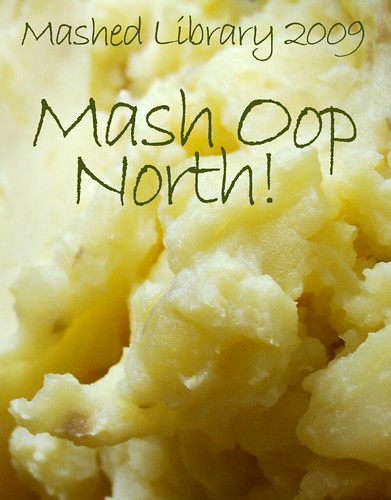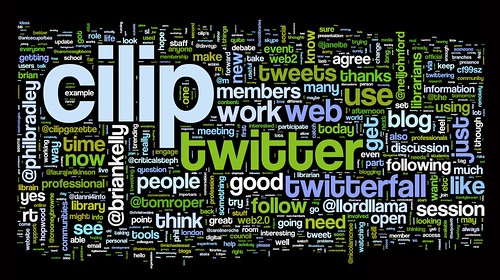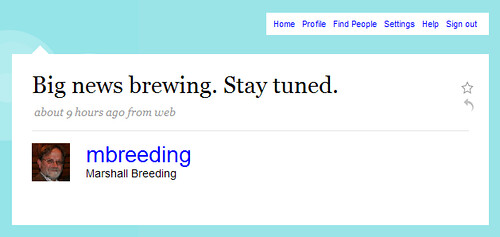We’re now accepting registrations for Mashed Library UK 2009: Mash Oop North!

Please see the event blog for further details.
————
Blimey — we’ve “sold out” already! Any bookings from 2:20pm onwards today will be placed on a waiting list.
Month: April 2009
Tracking the library angle on swine flu
For anyone who’s interested in how libraries and librarians are blogging about the swine flu outbreak, I’ve just added a dedicated RSS feed over on the HotStuff 2.0 blog: http://www.daveyp.com/hotstuff/?p=268

Transcript of the #cilip2 Twitter hastag
Despite a widespread network failure that seemed to affect quite a few universities, I finally managed to pick up all of the #cilip2 tweets from today’s event: http://www.daveyp.com/files/stuff/cilip2.html

Whenever I get a spare half-an-hour, I’ll do some analysis of the tweets. If anyone want a tab separated version of the data, you can grab it from here.
Sunny day
A gorgeous sunny day, ideal for a walk in the wood…


…or for lazing around in the garden…

OCLC to launch web based ILS
I’m guessing it’s safe to post this now, although I’m still expecting a phone call from lawyers representing OCLC and/or The Library Journal after “accidentally” stumbling on the news before it officially broke :-S
The LJ article (written by Marshall Breeding) isn’t live at the moment, but it the annoucement has appeared on the OCLC home pages:
– OCLC announces strategy to move library management services to Web scale
– Andrew Pace: And now for something completely different

Twittering ideas
Is your library looking a little tired and shabby? Are you patrons listless and lackadaisical? Are you in need of inspiration? Have you shifted your paradigms recently? Do you believe that ideas should come at regular 15 minute intervals and always be less than 140 characters long?
I should have thought of hooking the Library 2.0 Idea Generator into Twitter a long time ago 😀
Keyword search data
We’ve been logging all keyword searches on our OPAC for nearly 3 years and now have details for over 3 million searches. Just in case the data is of any use to anyone, I’ve uploaded an aggregated XML version to our web server: https://library.hud.ac.uk/data/keyworddata/
As with the usage data, we’re putting it out there with no strings attached by using an Open Data Commons Licence.
The XML file contains a list of about 8,500 keywords. For each keyword, there’s a list of other terms that have been used with that keyword in multi-term searches. The readme file contains more information about the structure.
Read my shocking story
Mashed Library UK 2009 – Mash Oop North!
The date for your diary is Tuesday 7th July 2009 and the event will take place in a large studio space in the Creative Arts Building at the University of Huddersfield. The online registration form should appear before the end of April.
If you want to keep up-to-date with the event, then make sure you join the mashedlibrary group on ning.com. You can also subscribe to the RSS feed from the event blog and the Twitter hash is #mashlib09.
The planning for the event is very much a group effort with seven of us having semi-regular meetings in pubs: Zoë, Lisa, Bryony, Tanya, Iman, Graham and myself. Although there’s still plenty of logistical stuff to figure out, it feels like the event is coming together nicely and hopefully we’ve managed to incorporate most of the feedback and suggestions from the first event.
The event will mostly be an unconference and we’re aiming to create an environment that will encourage networking, creativity and fun. Ideally, we’d like to attract a good mix of developers and tech-savvy librarians, and we think we can probably fit around 50 people into the studio.
The plan is to kick off with a couple of structured sessions, which will include an introduction to using Yahoo Pipes for those of you who’ve never played with mashups before (courtesy of the one-and-only Tony Hirst). At the same time, there’ll be a more techie session for the developers.
After those sessions, we’ll move to a more informal unconference style event. You’ll be encouraged to network, to get creative with the various available data sources, to brainstorm new ideas and to come up with prototypes.
If you’re a librarian with ideas, then Mashed Library is a fantastic opportunity to meet with techies who can turn those ideas into working prototypes and services. And, if you’re a techie, this is a chance to brainstorm with librarians and write code that’ll provide cool new services to library users!
We’d also like to encourage student librarians (and any other students who love libraries) to come to the event. We’ll shortly be announcing how you can apply for sponsorship to attend for free and to have your travel costs covered.
Speaking of sponsorship, we’d like to thank Talis for stepping up to be the main sponsors of the event. Talis have a long history of helping sponsor developer events (e.g. Code4Lib 2009) and they’ll be ensuring you don’t faint from lack of nourishment during the day!
We also like to attract sponsorship for prizes. If you’re an organisation who can make data available for the event, we’d love you to sponsor a prize for the best use of your data on the day (please get in touch with me if you’d like to discuss this)
Throughout the day we’ll be running short 5 minute “lightning talks”. Who’ll be giving those talks? You will, of course! The talks will be your chance to pitch an idea, show off something you’ve done, talk about your favourite web site/service, or to just rant for a few minutes. The talks will be optional, but we’re sure they’ll be something of interest to everyone.
Books that connect users
I thought it would be interesting to trawl the data and find out which books have been borrowed by the largest number of different courses within the university. I forget what the correct Graph Theory term is, but these are the books (nodes?) that connect together (edges?) the largest number of separate groups of students (networks?). The figure in brackets is the number of different courses that have borrowed the book.
- Questionnaire design, interviewing and attitude measurement by Oppenheim (245)
- Doing your research project: a guide for first-time researchers in education and social science (3rd ed) by Bell (215)
- Real world research: a resource for social scientists and practitioner-researchers (2nd ed) by Robson (190)
- Organisational behaviour and analysis: an integrated approach by Rollinson, Broadfield & Edwards (167)
- Sociology (3rd ed) by Giddens (161)
- The reflective practitioner: how professionals think in action by Schön (152)
- Experiential learning: experience as the source of learning and development by Kolb (150)
- Strategic management: awareness and change (3rd ed) by Thompson (134)
- Strategic management: an analytical introduction (3rd ed) by Luffman (133)
- Sociology: themes and perspectives (5th ed) by Haralambos & Holborn (133)
- Educating the reflective practitioner: toward a new design for teaching and learning in the professions by Schön (131)
- The good research guide: for small-scale social research projects by Denscombe (129)
- Qualitative data analysis: an expanded sourcebook (2nd ed) by Miles & Huberman (127)
- Health promotion: foundations for practice (2nd ed) by Naidoo & Wills (125)
- Team roles at work by Belbin (124)
- Research methods in education (5th ed) by Cohen, Manion & Morrison (124)
- How to research by Blaxter, Hughes & Tight (124)
- Understanding organizations (4th ed) by Handy (123)
- Basics of qualitative research: techniques and procedures for developing grounded theory (2nd ed) by Strauss & Corbin (121)
- The study skills handbook by Cottrell (120)
- Health promotion: models and values (2nd ed) by Downie, Tannahill & Tannahill (120)
- Doing qualitative research: a practical handbook by Silverman (116)
- Marketing by Lancaster & Reynolds (116)
- Reflection: turning experience into learning by Boud, Keogh & Walker (113)
- Management (6th ed) by Stoner, Freeman & Gilbert (109)
- No sweat!: the indispensable guide to reports and dissertations by Irving & Smith (109)
- The good study guide by Northedge (106)
- Research methods for nurses and the caring professions (6th ed) by Abbott & Sapsford (106)
- Marketing by Lancaster & Reynolds (106)
- Operations and the management of change by Gilgeous (106)
Conversely, these are the books that have only ever been borrowed by students on one specific course. The figure in brackets is the number of loans.
- The meaning of everyday occupation by Hasselkus (61)
- Perspectives in human occupation: participation in life by Kramer, Hinojosa & Royeen (48)
- Introduction to podopediatrics (2nd ed) by Thomson & Volpe (42)
- Occupational therapy without borders: learning from the spirit of survivors by Algado, Pollard & Kronenberg (38)
- Transformation through occupation by Watson & Swartz (38)
- Operating department practice A-Z by Smith & Williams (31)
- Lully, lulla, thou little tiny child: for soprano solo and SATB (unaccompanied), op.25 no.2 by Leighton (31)
- Five childhood lyrics: for unaccompanied mixed voices by Rutter (31)
- Task analysis: an occupational performance approach by Watson & Llorens (30)
- Conditions in occupational therapy: effect on occupational performance (3rd ed) by Atchison & Dirette (30)
